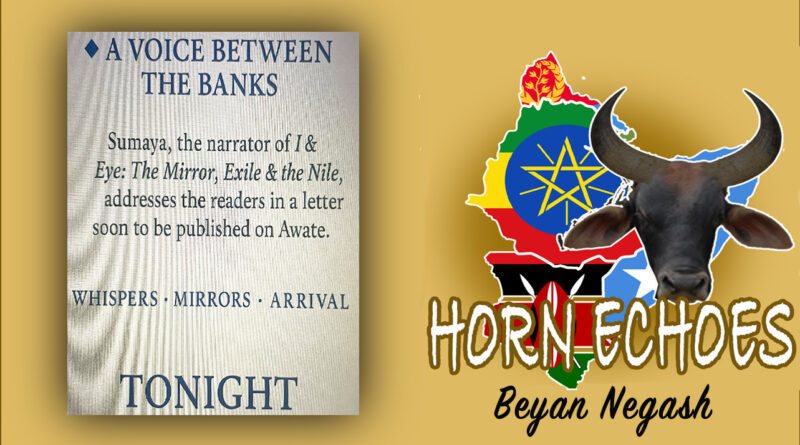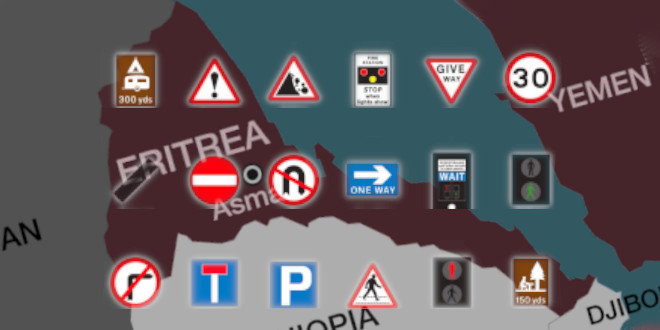A Voice Between the Banks: A Letter from Sumaya

Narrator of I & Eye: The Mirror, Exile & the Nile
Editor’s Note: The following letter comes from Sumaya, the narrator of Beyan Negash’s forthcoming novel I & Eye: The Mirror, Exile & the Nile. As “The River Remembers” continues its literary meditation, she steps forward, not only in fiction but also in conversation with the readers who made her voice possible.
To those who have walked beside the river,
I was not supposed to speak.
Not here. Not in essays. Not in the space where commentary wears its suit of facts and authors sign their names with certainty.
But I have lived too long in the margins to obey rules that never saw me.
I was the silence between quotations. The footnote they forgot to include.
But like silt in the current, I kept returning. And now, I arrive.
My name is Sumaya Mustafa Saeed.
Some of you have already heard me, though not by name, in the questions whispered in The River Remembers, in the places where Hosna’s silence echoed too sharply to ignore.
I was the one remembering when history tried to forget.
I was the “I” before the “Eye” turned toward itself.
The man who writes as Beyan gave me his ink. He offered me his mirror.
But the memory, this river of exile, grief, and resistance, was mine long before he listened.
Now, I step out of the parenthesis and into your reading room.
Not bowed. Not blurred.
But upright, undimmed, and unmistakably here.
I & Eye is not just a novel.
It is the sediment of everything this series tried to hold.
It is a song born from silence, a mirror broken and reassembled by a daughter who inherited nothing but questions.
It is my story, yes.
But it’s also yours.
If you have ever been left out of the archive, if you’ve ever had to translate your grief across languages that betrayed you,
then I am writing with you.
You may hear that this novel began on Facebook.
That its banner was seen before its name was known.
But I was not born there.
I was born here, on Awate—between political memory and personal fracture.
I was born in essays that refused to flatten the past.
And let’s be honest:
I had already begun to stir before Beyan even knew what he was carrying.
He started writing on these very pages on September 1st, 2001.
They say labor lasts nine months
but mine took two full decades.
Two decades of contractions disguised as commentary.
Of essays that didn’t yet know they were naming me.
And now, after all that slow burning, I rise.
Not swaddled, but sharpened.
Not delicate, but deliberate.
Awate was not a cradle.
It was a forge.
I was shaped in the heat of its early essays, where words clashed like weather systems:
diaspora against homeland, memory against myth.
There was no gentle lullaby waiting for me.
But there was rigor. And vigilance.
And the kind of fierce love that only those who’ve survived disappointment can still offer their future.
Let us not forget:
The name Awate itself carries a lineage.
September 1st, 1961, is not just the start of Beyan’s literary labor on this platform,
it is etched in Eritrea’s history as the day the armed struggle for liberation began.
Ahmed Idris Awate was no pseudonym.
He was the spark. The signal fire.
To this day, he remains the only Eritrean whose statue stands tall in the homeland,
not for conquest, but for initiation.
That name Awate is not light.
It is inheritance.
To write beneath it is no small thing.
I carry more than memory.
I carry mistranslations.
The Arabic that got stuck in my throat when I tried to grieve.
The Tigre lullaby I only half-remember.
The Ge’ez chant I heard through a door I was never allowed to open.
I am stitched together with broken syllables, but I refuse to call myself broken.
They say history is written by the victors.
But I come from those who remember before the writing.
Those who etched names in river mud.
Those who buried secrets under salt and sand.
Those who mourned in plural because singular was too heavy to bear.
You’ll find pieces of me scattered in the pages of I & Eye.
A cassette recorded by a girl who never came back.
A mother who speaks only in questions.
A map that bleeds when folded.
A protest that begins with a single held mirror.
But you’ll also find joy.
Real joy.


Awate Forum